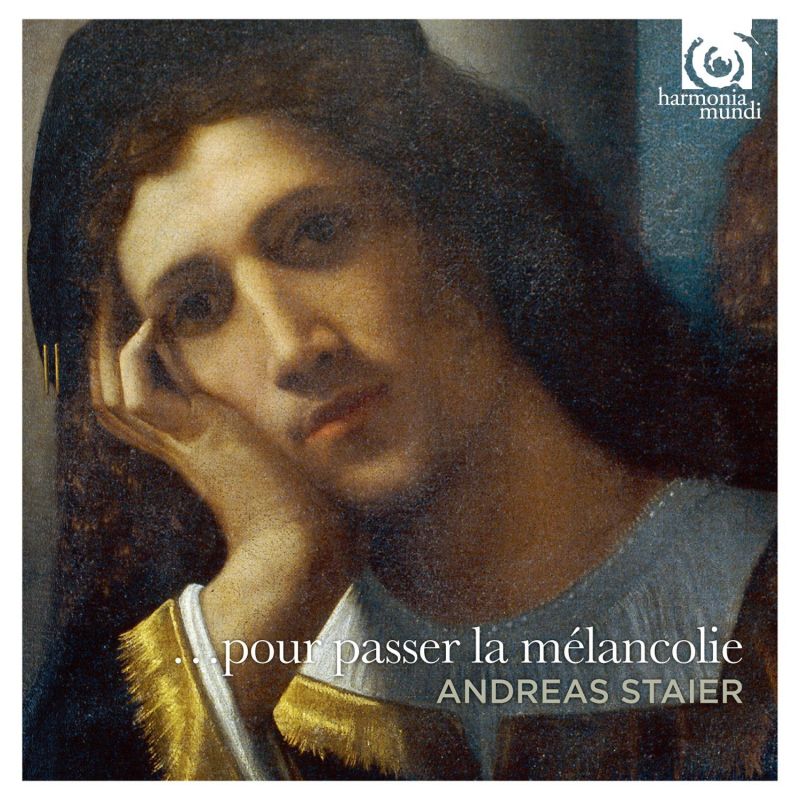Pour passer la Melancholie
Staier and his harpsichord in a world of melancholia
View record and artist detailsRecord and Artist Details
Composer or Director: Andreas Staier, Jean-Henri Anglebert, Johann Jacob Froberger, Louis-Nicolas Clérambault, Johann Caspar Ferdinand Fischer, Louis Couperin, Georg Muffat
Genre:
Instrumental
Label: Harmonia Mundi
Magazine Review Date: 05/2013
Media Format: CD or Download
Media Runtime: 0
Mastering:
Stereo
DDD
Catalogue Number: HMC90 2143

Tracks:
| Composition | Artist Credit |
|---|---|
| Suite No. 30 |
Johann Jacob Froberger, Composer
Andreas Staier, Composer Johann Jacob Froberger, Composer |
| Suite No. 6, Movement: Lamento |
Johann Jacob Froberger, Composer
Andreas Staier, Composer Johann Jacob Froberger, Composer |
| Pièces de Clavecin |
Jean-Henri Anglebert, Composer
Andreas Staier, Composer Jean-Henri Anglebert, Composer |
| Musicalischer Parnassus |
Johann Caspar Ferdinand Fischer, Composer
Andreas Staier, Composer Johann Caspar Ferdinand Fischer, Composer |
| Ariadne musica |
Johann Caspar Ferdinand Fischer, Composer
Andreas Staier, Composer Johann Caspar Ferdinand Fischer, Composer |
| Suite |
Louis Couperin, Composer
Andreas Staier, Composer Louis Couperin, Composer |
| Premier livre de pièces de clavecin, Movement: Suite No. 2, C minor |
Louis-Nicolas Clérambault, Composer
Andreas Staier, Composer Louis-Nicolas Clérambault, Composer |
| Apparatus musico-organisticus, Movement: Passacaglia in G minor |
Georg Muffat, Composer
Andreas Staier, Composer Georg Muffat, Composer |
Author: Philip Kennicott
Melancholia was one of the basic humours of the body, its etymology referring to the black bile which Greek physicians believed was the cause of the sadness, listlessness and general malaise associated with the affliction. Today we would say ‘depression’ and treat it with drugs. But in the 17th century in particular it was closely associated both with artistic and intellectual creation, and with music, which was deemed the best remedy for the suffering.
From the same general period we have curious, almost programmatic works for the harpsichord: the tombeau, which served as musical grave marker or epitaph; the passacaglia, which reached extremes of tension and expressivity; and impossible-to-categorise fantasy works which bore titles seemingly ripped from the sensitive artist’s daily journal. In the last of these categories are some exceptionally beautiful and haunting pieces by Froberger, which form the backbone of Staier’s album.
The challenge here is to manage so many musical oddities, so much over-the-top straining at new sounds and new ways to intensify the harpsichord’s aural possibilities. These pieces were probably never intended to be heard in such close proximity to each other but trotted out as rarities and novelties. But Staier paces the album well, raising the temperature with the brilliant virtuoso bric-a-brac of Fischer (who loved repetitive figuration and ostinato patterns) then rapidly downshifting to the more intimate and nourishing meditations of Louis Couperin.
If there’s a quibble to be raised it is that, in an album devoted to a kind of emotional excess, Staier gives generally Apollonian performances. Compare the austerity and temporal stretching of Christophe Rousset’s reading of the Couperin Tombeau (Aparté) with Staier’s more forthright approach and it’s hard not to be a little disappointed with the latter’s caution. But Staier’s Froberger is played with a sure hand and a compelling sense of how to stretch the music’s almost verbal rhetoric to the limits of what the musical line can bear. And while any more Fischer would be too much, Staier’s sheer exuberance in rendering this deliciously absurd music is infectious. The instrument, a thoroughly rebuilt anonymous harpsichord (the original ravelement dated Lyons, 1748), has more than sufficient personality to bear up to the musical demands.
Explore the world’s largest classical music catalogue on Apple Music Classical.
Included with an Apple Music subscription. Download now.

Gramophone Digital Club
- Digital Edition
- Digital Archive
- Reviews Database
- Events & Offers
From £9.20 / month
Subscribe
Gramophone Club
- Print Edition
- Digital Edition
- Digital Archive
- Reviews Database
- Events & Offers
From £11.45 / month
Subscribe
If you are a library, university or other organisation that would be interested in an institutional subscription to Gramophone please click here for further information.






